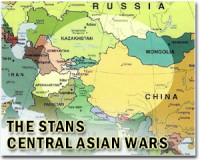| . |  |
. |
Yousef Khel, Afghanistan (AFP) April 18, 2010 The young governor of Yousef Khel district in eastern Afghanistan takes US Army Lieutenant Marcus Smith by the hand and leads him down a slippery slope. "Partnership," Smith says, as the two walk hand-in-hand over churned-up wheat fields, repeating the message at the heart of the strategy he is trying to implement in the small outpost he commands in Paktika province. A determination to implement US and NATO commander General Stanley McChrystal's counter-insurgency strategy is evident among the soldiers in this part of Afghanistan. At bases across the east, inverted pyramids and intricate flow charts are tacked to walls and scrawled on white boards, with slogans such as: "The population is the centre of gravity." Up mountains and through valleys, soldiers on patrol muse on historical counter-insurgency campaigns and the writings of Che Guevara or Mao Zedong, trying to find analogies for their modern war. "We came in with a counter-terrorism strategy specifically to remove the Taliban," said US Army Major Steven Bower, an intelligence officer for the eastern Afghan provinces of Khost, Paktika and Paktya. "You have to transition into a strategy that looks, smells and tastes like counter-insurgency -- you've got to provide security, you've got to build capacity and government." It has been a bruising year for foreign forces. Some 520 troops died last year, the highest number since the start of the US-led military action to oust the hardline Taliban regime in late 2001. Troop numbers are set to peak at 150,000 by August as a push against the Taliban in their southern heartland intensifies. Afghan National Army (ANA) numbers are also increasing. On the ground, more bases are being manned jointly by NATO and Afghan forces and NATO's International Security Assistance Force (ISAF) is funding development projects promoted to Afghans as government initiatives. Frequent meetings with local elders aim to bring Afghans into contact with local authorities, often for the first time. But implementing the plan creates problems, too. In some remote areas there is no government partner. In others, local leaders are too young and inexperienced to have any influence. Rookie Afghan police and army lock horns, while wary tribal elders refuse to cooperate. Militants are attacking development projects while money is frequently skimmed in the corruption-riddled nation, US officials say. "It's a very slow and tedious process and you take a couple of steps forward and you take a step backwards here and there," said Lieutenant Colonel David Fivecoat, commander of 3rd Battalion, 187th Infantry Regiment in Paktika. Fivecoat talks about the "oil spot" theory: bringing security and establishing a government presence in one population centre before branching out to smaller, outlying villages. But it is a tug-of-war for influence and allegiance, he added, as Taliban attacks and pressure on the locals intensifies. In southern Afghanistan, foreign forces are focused on the first principle of counter-insurgency -- restoring security. Many of the new troops have arrived, launching massive assaults into urban areas to wrest them back from Taliban control. Eastern Afghanistan has had a NATO presence for much longer, and while attacks are rising, military officials say McChrystal's strategy is already taking hold. Troops numbers are set to double in the east this year and more civilians are being brought in for development work. "I think I have seen the results here in RC (Regional Command) East," said Major General Curtis Scaparrotti, head of ISAF operations in the east. "We have areas that are much more secure now that the Afghan security forces and the civil leadership have taken charge and we're beginning to expand from those." But Afghans working the parched fields and trying to dodge the Taliban feel they have a long way to go before their lives improve. Government officials also see a difficult road ahead. "I don't think the US are going to leave us by ourselves because our ANA and ANP (Afghan army and police) need more time and more work," said Abdul Qayum Katawazy, governor of Paktika province. "Then they can leave. But in the current situation, I don't think so."
Share This Article With Planet Earth
Related Links News From Across The Stans
 Turkey's 'village guards' tired of conflict with fellow Kurds
Turkey's 'village guards' tired of conflict with fellow KurdsSiirt, Turkey (AFP) April 18, 2010 Dressed in military fatigues, his Kalashnikov leaned against a wall, Mahsun Alan sips tea at a watch post on a steep hill, keeping a sharp eye on a road snaking between rugged mountains. The 44-year-old is among thousands of poor Kurdish villagers who have volunteered - often grudgingly - to help the Turkish army fight fellow Kurds of the separatist Kurdistan Workers' Party (PKK), only to ... read more |
|
| The content herein, unless otherwise known to be public domain, are Copyright 1995-2010 - SpaceDaily. AFP and UPI Wire Stories are copyright Agence France-Presse and United Press International. ESA Portal Reports are copyright European Space Agency. All NASA sourced material is public domain. Additional copyrights may apply in whole or part to other bona fide parties. Advertising does not imply endorsement,agreement or approval of any opinions, statements or information provided by SpaceDaily on any Web page published or hosted by SpaceDaily. Privacy Statement |